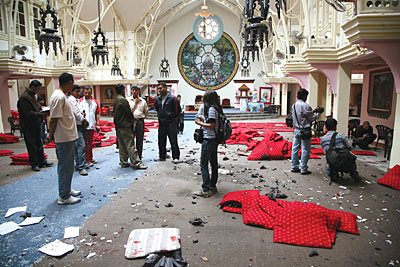 MIN RATNA BAJRACHARYA |
The terror attack in Norway last week revealed some home truths. While Norway and the world recuperates, it may be time for us here in South Asia to sit up and worry.
This is yet another instance of senseless violence unleashed in the name of religion. All religions preach compassion and tolerance, yet more human life has been taken by fellow humans for religious reasons in history than any other. There was a twist to this in Norway. A Christian man killed mostly Christians even though his real grievance was against Muslims. This should temper some of the knee-jerk blame on one religion or community for what is now a worldwide problem.
As state and religion compete for control despite constitutionally-separated powers, it is increasingly clear that monolithic religious ideas stand at odds with society's multicultural and democratic aspirations. South Asia has witnessed this ever since the holocaust of the partition of India and Pakistan in 1947 and the assassination of Mahatma Gandhi by a Hindu zealot. More than seven decades later, the region is still regularly wracked by religious pogroms and politically-backed religious extremism.
In September 2004, a mob of trident-waving extremists, riding on public outrage over the brutal killings of 12 Nepalis in Iraq by terrorists, tried to restage the Babri Masjid demolition in Kathmandu's Jama Masjid.
It was clear at the time that religion was just an excuse and the democratic parties fanned the flames in order to corner the Gyanendra regime.
Another Mosque in Biratnagar was attacked with grenades in March 2008. A group calling itself the Nepal Defense Army, with a declared agenda of restoring the Hindu monarchy claimed responsibility. The same group murdered a Catholic priest in Eastern Nepal in 2008, and a year later planted a bomb at the Assumption Church in Kathmandu that killed three worshippers (pictured, above).
While the attacks by Islamist groups in India, Pakistan and Afghanistan are condemned worldwide, similar attacks by Hindu extremist groups in India and Nepal are rarely referred to as "terrorist" attacks. It's always "Islamic terrorists" and "rightwing Hindu extremists".
The bloody carnage in Gujarat in 2002 and Kandhamal in Orissa and Karnataka in 2008 have neither been referred to as a "terrorist" attacks nor have they been condemned at an international level with the same sense of outrage that one sees following a "jihadist terror attack". In spite of the proven involvement of high profile priests and ex-army personnel in mosque bombings across India, it is somehow still only Islamists who bear the terror label.
Amidst the global "war on terror", the mainstream rarely looks beyond beards and burkhas for terrorists. And this is why western media and society is shocked to find terrorists in their midst. It is highly unlikely that Anders Behring Breivik will ever be called a "Protestant terrorist" on CNN.
Meanwhile in the subcontinent our love for freedom and democracy has failed to teach us tolerance and respect towards multicultural values. We are lurching from a fatalistic society to one that believes in work and progress, but the relics of old power structures threaten to drag us back. What happened in Norway last week is no different from what happened in Mumbai in 2008.
Extremism is not a trait endemic to a particular community. There is a potential for violent outburst in every individual or group in various ways and under different circumstances, when social, political, religious and cultural values rub against each other. There is no capsule solution to the problem and each society must deal with its share of extremism in its own way. Exporting or importing remedies won't work.
The Oslo bombing and massacre should prompt developed nations that while they invest heavily in promoting democracy the world over, maybe they ought to pause and take a closer look at their own society.



